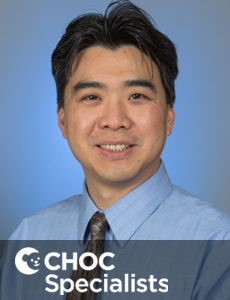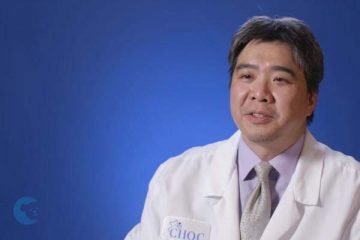Dr. Raymond Y. Wang, Metabolic Disorders

- Raymond Y Wang MD
- Appointments:
888-770-2462 - Office: 714-509-8852
- Specialty: Metabolic Disorders
- Board Certified: Clinical Genetics, Clinical and Biochemical Genetics
Dr. Raymond Wang, M.D., is a distinguished clinical geneticist and biochemical genetics specialist based at CHOC Children’s Hospital in Orange, CA. As the Director of the Foundation of Caring Lysosomal Storage Disorder Program, Dr. Wang oversees a multidisciplinary team dedicated to the comprehensive care and advancement of treatments for patients with rare lysosomal storage disorders. Dr. Wang is aware of the challenges faced by patients and families with rare diseases such as lysosomal storage disorders.
His expertise in genetic disorders and commitment to translational research have significantly contributed to the development of innovative therapies, including investigational treatments for conditions without current effective options. Dr. Wang’s dedication extends beyond treatment to include spearheading research initiatives aimed at discovering “next-generation” cures and improving the quality of life for his patients.
His clinical interests encompass a wide range of genetic disorders, with a particular focus on mucopolysaccharidosis, Pompe disease, and neuronal ceroid lipofuscinosis, among others.
Dr. Raymond Wang’s role at CHOC Children’s Hospital encapsulates a blend of clinical practice, innovative research, and academic leadership, all aimed at improving the lives of children with complex genetic disorders. His work not only addresses immediate healthcare needs but also sets the groundwork for future advancements in the diagnosis, treatment, and management of lysosomal storage disorders.
Lysosomal Storage Disorders; Mucopolysaccharidoses (MPS), Pompe Disease (PD), Neuronal Ceroid Lipofuscinosis (Batten), GM1/GM2 Gangliosidosis, Free sialic acid storage disease (FSASD or Salla)
Research FocusGenomic therapies (gene therapy, CRISPR-gene editing), clinical trials, developing therapies for neurodegenerative lysosomal storage disorders
Raymond Y Wang MD is on staff at CHOC Hospital in Orange .
Locations
CHOC Clinic
1201 W. La Veta Ave. Building: CHOC Clinic
Orange, CA 92868
phone: 888-770-2462
fax: 855-246-2329
Educational Background
- Undergraduate Study
Stanford University, Stanford, CA - Medical School
UCLA School of Medicine, Los Angeles, CA - Medical Genetics/Pediatrics Residency
Cedars-Sinai Medical Center, Los Angeles, CA - Biochemical Genetics Fellowship
Cedars-Sinai Medical Center, Los Angeles, CA
Academic Appointments
- Associate Clinical Professor, Pediatrics
University of California, Irvine School of Medicine - Clinical teaching faculty, Pediatrics
UCLA Intercampus Genetics Program
Administrative Appointments
- Director, California Institute of Regenerative Medicine Alpha Stem Cell Clinic, CHOC
- Director, Foundation of Caring Lysosomal Storage Disorder Program, CHOC
- CHOC Specialists, Metabolic Disorders
Research Bio
Dr. Raymond Wang, based at CHOC Children’s Hospital, is a prominent figure in the field of pediatric neurodegenerative diseases, focusing on the development of novel therapies for lysosomal storage disorders (LSDs). His research is centered on improving the lives of children suffering from these severe, inherited conditions, which typically result in progressive multisystemic symptoms due to the accumulation of substrates within the lysosomes of cells. Dr. Wang has been instrumental in advancing treatment protocols that significantly extend life expectancy and enhance the quality of life for affected patients.
A key aspect of Dr. Wang’s work involves refining therapeutic approaches for organ systems that are resistant to traditional treatments such as hematopoietic stem cell transplantation and intravenous enzyme replacement therapy. Recognizing the limitations of existing treatments, he has pioneered the use of gene therapy and gene editing techniques aimed at directly correcting the genetic errors underlying these disorders. His innovative approaches are designed to halt or even reverse the progression of disease in organs previously deemed untreatable.
Through his leadership at CHOC, Dr. Wang’s research not only pushes the boundaries of medical science but also provides a beacon of hope for families grappling with the challenges of neurodegenerative diseases. His contributions are vital in shaping future interventions that may one day cure these devastating conditions.
Member
- Society, Inherited Metabolic Disease
- Society, Study of Inborn Errors of Metabolism
- Society, American Society of Gene & Cell Therapy
Clinical Trials
For more information about clinical trials, please email Metabolics.CRC@choc.org.
-
- ; Gene Transfer Clinical Trial for Infantile and Late Infantile Krabbe Disease Treated Previously With HSCT (REKLAIM)
-
- ; Early Access Program With Arimoclomol in US Patients With NPC
-
- ; RGX-111 Gene Therapy in Patients With MPS I
-
- ; Cerliponase Alfa Observational Study in the US
-
- ; Mucopolysaccharidosis I (MPS I) Registry
-
- ; Pompe Disease Registry Protocol
-
- ; International Collaborative Gaucher Group (ICGG) Gaucher Disease Registry & Pregnancy Sub-registry
- ; Fabry Disease Registry & Pregnancy Sub-registry
Translational Research
Therapeutic Intervention through Base Editing of the GLB1 Gene in GM1 Gangliosidosis Patient-Derived Cells
Base Editing Correction of Common Salla Disease SLC17A5c.115C>T Finnish Founder Variant
Restoration of GAA Expression and Function through Base Editing of Pompe Disease GAA Variants
Improvement of Hypertrophic Cardiomyopathy in a PD knock-in Murine Model with Neonatal Gene Therapy
Prime Editing Correction of the Gaa c.1935C>A Pathogenic Variant in IOPD mouse myoblasts
Cardiovascular Structure and Function in the Mucopolysaccharidoses
Generation and Characterization of Transgenic Murine Models of Infantile-onset Pompe Disease
Selected Publications
Harb JF, Christensen CL, Kan SH, Rha AK, Andrade-Heckman P, Pollard L, Steet R, Huang JY, Wang RY. Base editing corrects the common Salla disease SLC17A5 c.115C>T variant. Mol Ther Nucleic Acids. 2023 Aug 26;34:102022. doi: 10.1016/j.omtn.2023.08.024. eCollection 2023 Dec 12.
Christensen C, Heckman P, Rha A, Kan SH, Harb J, Wang R. Generation of two induced pluripotent stem cell lines (CHOCi002-A and CHOCi003-A) from Pompe disease patients with compound heterozygous mutations in the GAA gene. Stem Cell Res. 2023 Jun;69:103117. doi: 10.1016/j.scr.2023.103117. Epub 2023 May 6. PubMed PMID: 37167752; PubMed Central PMCID: PMC10281086.
Kan SH, Huang JY, Harb J, Rha A, Dalton ND, Christensen C, Chan Y, Davis-Turak J, Neumann J, Wang RY. CRISPR-mediated generation and characterization of a Gaa homozygous c.1935C>A (p.D645E) Pompe disease knock-in mouse model recapitulating human infantile onset-Pompe disease. Sci Rep. 2022 Dec 14;12(1):21576. PMID: 36517654; PMCID: PMC9751086.
Huang JY, Kan SH, Sandfeld EK, Dalton ND, Rangel AD, Chan Y, Davis-Turak J, Neumann J, Wang RY. CRISPR-Cas9 generated Pompe knock-in murine model exhibits early-onset hypertrophic cardiomyopathy and skeletal muscle weakness. Sci Rep. 2020 Jun 25;10(1):10321. doi: 10.1038/s41598-020-65259-8. PubMed PMID: 32587263; PubMed Central PMCID: PMC7316971.
Wang RY, Rudser KD, Dengel DR, Evanoff N, Steinberger J, Movsesyan N, Garrett R, Christensen K, Boylan D, Braddock SR, Shinawi M, Gan Q, Montaño AM. Abnormally increased carotid intima media-thickness and elasticity in patients with Morquio A disease. Orphanet J Rare Dis. 2020 Mar 17;15(1):73. PMID 32183856 / PMC7079365
Wang RY, Rudser KD, Dengel DR, Braunlin EA, Steinberger J, Jacobs DR, Sinaiko AR, Kelly AS. The Carotid Intima-Media Thickness and Arterial Stiffness of Pediatric Mucopolysaccharidosis Patients Are Increased Compared to Both Pediatric and Adult Controls. Int J Mol Sci. 2017; 18. pii: E637
Wang RY, Aminian A, McEntee M, Kan H, Simonaro CM, Lamanna WC, Lawrence R, Ellinwood NM, Guerra C, Le SQ, Dickson PI, Esko, JD. Intra-articular rhIDUA administration in the canine model of MPS I is safe, well-tolerated, and reduces articular GAG storage in the canine model of MPS I.Mol Genet Metab 2014; 112: 286-293.
Discover more about Dr. Raymond Wang’s research at the NIH National Library of Medicine.
Selected Presentations
Exploring Pompe disease: Insights into the natural history of novel Gaac.1826dupA knock-in murine model. 2024 World Symposium Meeting, San Diego, CA
Restoration of acid-alpha glucosidase expression and function through efficient adenine base editing of Pompe disease variants. 2024 World Symposium Meeting, San Diego, CA
Improvement of hypertrophic cardiomyopathy in Gaac.1826dupA knock-in murine model with neonatal gene therapy. 2024 World Symposium Meeting, San Diego, CA
Prime editing corrects the Gaa c.1935C>A pathogenic variant in infantile-onset Pompe disease mouse myoblasts. 2024 World Symposium Meeting, San Diego, CA
First in-human, intracisternal dosing of RGX-111, an investigational AAV gene therapy, for a 21-month-old child with mucopolysaccharidosis type I (MPS I): 3.5-year follow-up. 2024 World Symposium Meeting, San Diego, CA
RGX-111 gene therapy for the treatment of severe mucopolysaccharidosis type I (MPS I): Interim analysis of data from the first in human study. 2022 SSIEM Meeting, Freiburg, Germany Sustained efficacy and safety of vestronidase alfa (rhGUS) enzyme replacement therapy in patients with MPS VII. 2018 Lysosomal Disease Network Meeting, San Diego, CA
Appointed Positions
2024 – Present: Center and Excellence Steering Committee, Batten Disease Support & Research Association
2023 – Present: Associate Editor, Scientific Reports
2021 – Present: Scientific Advisory Board, National MPS Society
2020 – Present: Scientific Advisory Board, Salla Treatment and Research Foundation
2019 – Present: Clinical Efficacy and Efficiency Committee, CHOC Children’s Hospital
2019 – Present: Orange County Medi-Caid (Cal-Optima) Pharmacy & Therapeutics Committee
2019 – 2022: Associate Editor, Orphanet Journal of Rare Diseases
2019 – 2021: Editor, International Journal of Neonatal Screening Pompe Disease Special Focus Issue
Learn More
Programs & General Information:
Metabolic Disorders
Lysosomal Storage Disease Program
Rare Disease Research
MPS Multidisciplinary Center
Batten Disease Program
Articles:
Lysosomal disease researchers at CHOC have large presence at global conference
Improving outcomes and treatments for lysosomal storage disorders
CHOC receives prestigious NIH grant to study treatment for rare lysosomal storage disease
CHOC joins select group of U.S. healthcare systems designated as a Rare Disease Center of Excellence
Metabolic disorder families increasingly turning to CHOC for historic gene therapy treatments
CHOC joins drug trial for rare disease that devastates families
CHOC receives $8 million to advance research for rare disorder
Videos

Dr. Raymond Wang discusses the symptoms and treatment options for Batten disease, also known as neuronal ceroid lipofuscinoses (NCL).












